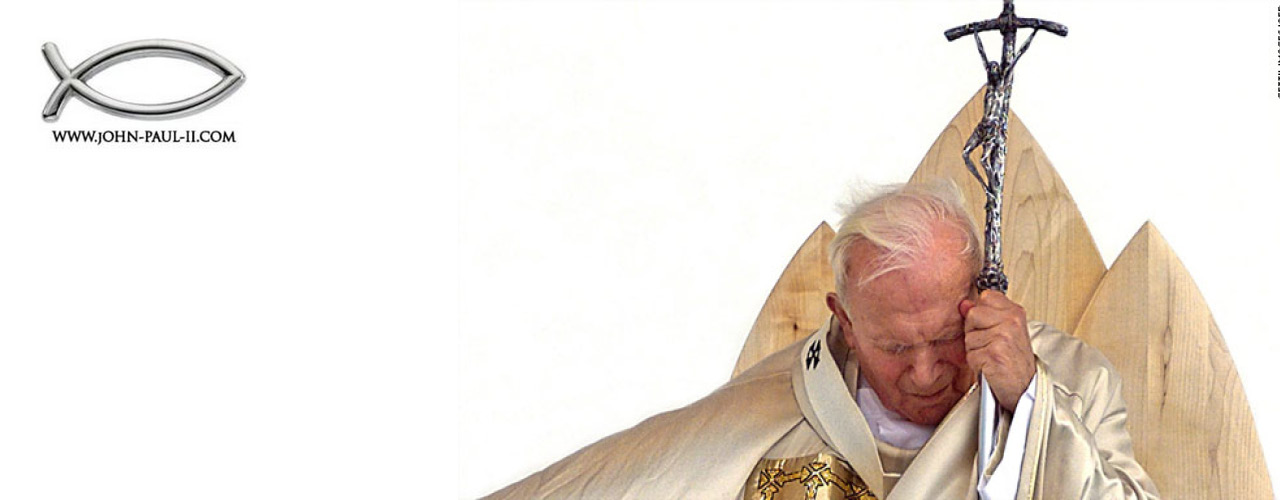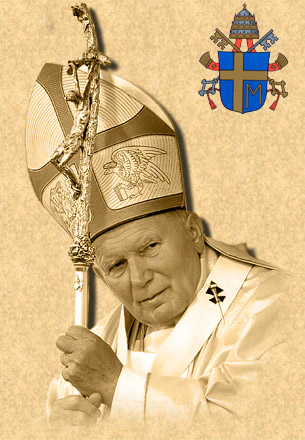Teachings
As pope, John Paul II wrote 14 papal encyclicals and taught about "The Theology of the Body". Some key elements of his strategy to "reposition the Catholic Church" were encyclicals such as Ecclesia de Eucharistia, Reconciliatio et Paenitentia and Redemptoris Mater. In his At the beginning of the new millennium (Novo Millennio Ineunte), he emphasised the importance of "starting afresh from Christ": "No, we shall not be saved by a formula but by a Person." In The Splendour of the Truth (Veritatis Splendor), he emphasised the dependence of man on God and His Law ("Without the Creator, the creature disappears") and the "dependence of freedom on the truth". He warned that man "giving himself over to relativism and scepticism, goes off in search of an illusory freedom apart from truth itself". In Fides et Ratio (On the Relationship between Faith and Reason) John Paul promoted a renewed interest in philosophy and an autonomous pursuit of truth in theological matters. Drawing on many different sources (such as Thomism), he described the mutually supporting relationship between faith and reason, and emphasised that theologians should focus on that relationship. John Paul II wrote extensively about workers and the social doctrine of the Church, which he discussed in three encyclicals: Laborem Exercens, Solicitudo Rei Socialis, and Centesimus Annus. Through his encyclicals and many Apostolic Letters and Exhortations, John Paul II talked about the dignity of women and the importance of the family for the future of humanity. Other encyclicals include The Gospel of Life (Evangelium Vitae) and Ut Unum Sint (That They May Be One). Though critics accused him of inflexibility in explicitly re-asserting Catholic moral teachings against euthanasia and abortion that have been in place for well over a thousand years, he urged a more nuanced view of capital punishment.
Social and political stances
John Paul II was considered a conservative on doctrine, and issues relating to sexual reproduction and the ordination of women.
While the Pope was visiting the United States of America he said, "All human life, from the moments of conception and through all subsequent stages, is sacred."
A series of 129 lectures given by John Paul II during his Wednesday audiences in Rome between September 1979 and November 1984 were later compiled and published as a single work entitled ‘Theology of the Body’, an extended meditation on human sexuality. He extended it to the condemnation of abortion, euthanasia and virtually all capital punishment, calling them all a part of the "culture of death" that is pervasive in the modern world. He campaigned for world debt forgiveness and social justice. He coined the term "social mortgage", which related that all private property had a social dimension, namely, that "the goods of this are originally meant for all." In 2000, he publicly endorsed the Jubilee 2000 campaign on African debt relief fronted by Irish rock stars Bob Geldof and Bono, once famously interrupting a U2 recording session by telephoning the studio and asking to speak to Bono.
Pope John Paul II, who was present and very influential at the Vatican II (1962–65), affirmed the teachings of that Council and did much to implement them. Nevertheless, his critics often wished that he would embrace the so-called "progressive" agenda that some hoped would evolve as a result of the Council. In fact, the Council did not advocate "progressive" changes in these areas; for example, they still condemned abortion as an unspeakable crime. Pope John Paul II continued to declare that contraception, abortion, and homosexual acts were gravely sinful, and, with Joseph Ratzinger (future Pope Benedict XVI), opposed Liberation theology.
Following the Church's exaltation of the marital act of sexual intercourse between a baptised man and woman within sacramental marriage as proper and exclusive to the sacrament of marriage, John Paul II believed that it was, in every instance, profaned by contraception, abortion, divorce followed by a 'second' marriage, and by homosexual acts. His beliefs were often assumed to be a rejection of women. In 1994 John Paul II asserted the Church's lack of authority to ordain women to the priesthood, claiming that without such authority ordination is not legitimately compatible with fidelity to Christ. This was also deemed a repudiation of calls to break with the constant tradition of the Church by ordaining women to the priesthood. In addition, John Paul II chose not to end the discipline of mandatory priestly celibacy, although in a small number of unusual circumstances, he did allow certain married clergymen of other Christian traditions who later became Catholic to be ordained as Catholic priests.
Evolution
On 22 October 1996, in a speech to the Pontifical Academy of Sciences plenary session at the Vatican, Pope John Paul II said of evolution that "this theory has been progressively accepted by researchers, following a series of discoveries in various fields of knowledge. The convergence, neither sought nor fabricated, of the results of work that was conducted independently is in itself a significant argument in favour of this theory." The Pope qualified this by noting that, "rather than the theory of evolution, we should speak of several theories of evolution." Some of these theories, he noted, have a purely materialistic philosophical underpinning which is not compatible with the Catholic faith: "Consequently, theories of evolution which, in accordance with the philosophies inspiring them, consider the mind as emerging from the forces of living matter, or as a mere epiphenomenon of this matter, are incompatible with the truth about man".
Although generally accepting the theory of evolution, John Paul II made one major exception – the human soul. "If the human body has its origin in living material which pre-exists it, the spiritual soul is immediately created by God".
Iraq War
In 2003 John Paul II also became a prominent critic of the 2003 US-led invasion of Iraq. In his 2003 State of the World address, the Pope declared his opposition to the invasion by stating, "No to war! War is not always inevitable. It is always a defeat for humanity." He sent former Apostolic Pro-Nuncio to the United States Pío Cardinal Laghi to talk with American President George W. Bush to express opposition to the war. John Paul II said that it was up to the United Nations to solve the international conflict through diplomacy and that a unilateral aggression is a crime against peace and a violation of international law.
“Wars generally do not resolve the problems for which they are fought and therefore... prove ultimately futile.”
— Pope John Paul II
In 2003, the year of the American invasion of Iraq, Pope John Paul II, who opposed the Iraq War perhaps more vigorously than any other world leader, was widely viewed as a favourite to win the Nobel Peace Prize.
Apartheid in South Africa
Pope John Paul II was an outspoken opponent of apartheid in South Africa. In 1985, while visiting the Netherlands, he gave an impassioned speech condemning apartheid at the International Court of Justice, proclaiming that "no system of apartheid or separate development will ever be acceptable as a model for the relations between peoples or races." In September 1988, Pope John Paul II made a pilgrimage to ten countries bordering South Africa, while demonstratively avoiding South Africa. During his visit to Zimbabwe, John Paul II called for economic sanctions against South Africa's government. After John Paul II's death, both Nelson Mandela and Archbishop Desmond Tutu praised the Pope for defending human rights and condemning economic injustice.
Liberation theology
In 1984 and 1986, through leader of the Congregation for the Doctrine of the Faith Cardinal Ratzinger (later Pope Benedict XVI), John Paul II officially condemned aspects of Liberation theology, which had many followers in South America. Visiting Europe, Óscar Romero unsuccessfully attempted to obtain a Vatican condemnation of El Salvador's regime, for violations of human rights and its support of death squads. In his travel to Managua, Nicaragua, in 1983, John Paul II harshly condemned what he dubbed the "popular Church" (i.e. "ecclesial base communities" supported by the CELAM), and the Nicaraguan clergy's tendencies to support the leftist Sandinistas, reminding the clergy of their duties of obedience to the Holy See. During that visit Ernesto Cardenal, a priest and minister in the Sandinista government, knelt to kiss his hand. John Paul withdrew it, wagged his finger in Cardenal's face, and told him, "You must straighten out your position with the church."
Views on sexuality
While taking a traditional position on sexuality, defending the Church's moral opposition to marriage for same-sex couples, Pope John Paul II asserted that people with homosexual inclinations possess the same inherent dignity and rights as everybody else. In his book, Memory and Identity, he referred to the "strong pressures" by the European Parliament to recognise homosexual unions as an alternative type of family, with the right to adopt children. In the book, as quoted by Reuters, he wrote: "It is legitimate and necessary to ask oneself if this is not perhaps part of a new ideology of evil, more subtle and hidden, perhaps, intent upon exploiting human rights themselves against man and against the family." A 1997 study determined that 3% of the pope's statements were about the issue of sexual morality.





